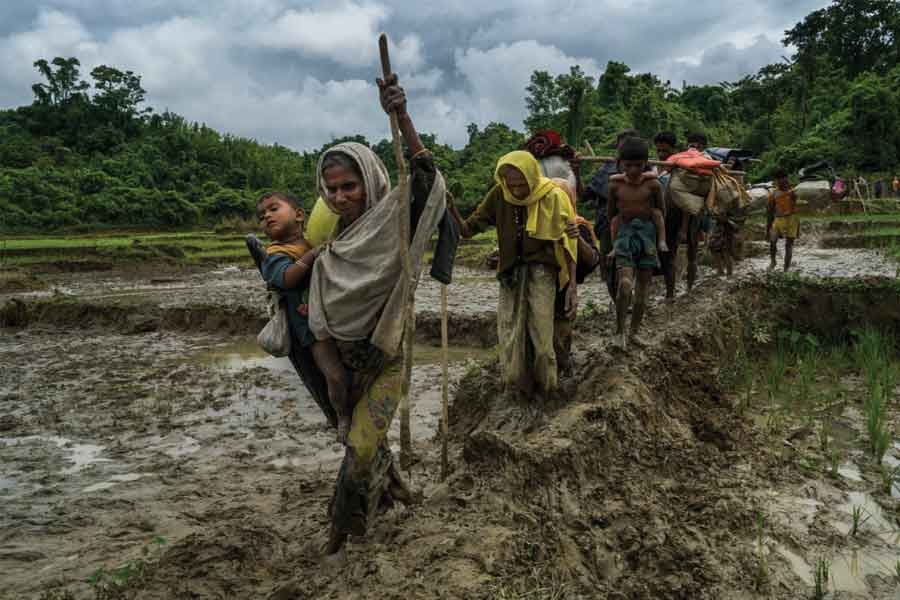The signing of the terms of reference (ToR) by Bangladesh and Myanmar, on Tuesday last, to form a joint working group (JWG) in a bid to start the repatriation process of refugees is apparently an important breakthrough in the bilateral negotiations on the Rohingya crisis.
It is assumed that the formation of the JWG would expedite the repatriation process which is scheduled to start on January 23, 2018. But an effective outcome of the deal depends on the astute handling of the entire issue and there lies several challenges ahead of the country's foreign office high-ups.
Till date, nearly seven million Rohingyas were forced to flee their homes in Rakhine state in the face of state-sponsored discrimination and segregation that amounts to apartheid since August 25, and the number is increasing by the day.
Bangladesh has to bear the brunt, socially as well as economically, of the fresh influx of such a huge number of refugees in a period of only four months. According to an estimate by Boston-based International Sustainable Development Institute, cost for providing food and shelter to 600 thousand refugees in Cox's Bazaar stands at US$ 4.0 million per day.
So commencing the repatriation of the refugees on time is crucial to Bangladesh. A lot of things are needed to be done by the JWG in the coming days to make it happen. The major challenges in addressing the repatriation issue are:
- First, the JWG will have to devise a practical and realistic verification process. The repatriation deal requires presentation of documents by the refugees to prove that they are the residents of Rakhine state. Since thousands of Rohingyas had to flee home in a hurry in the face of sheer brutality, unleashed by the Myanmar army, many of them may not be able to present such documents. So, for these cluster of people an alternative verification mechanism should be devised by the JWG.
- Second, ensuring the security of the repatriated Rohingyas. The agreement stipulates safe return of all those who would return to Rakhine voluntarily. If a stable situation in Rakhine can not be ensured none would be willing to go back to Rakhine and thus entire exercise for the repatriation will be futile.
- And finally, ensuring livelihood for the repatriated refugees. If proper shelter and employment could not be ensured for the Rohingyas after their repatriation, they will not feel encouraged to return to their native place.
Maintaining the schedule is important. There was already a delay in signing the ToR for JWG. The November 23 resettlement agreement stipulated formation of the JWG by December 14. That deadline was missed. The ToR was signed on December 19 and nobody knows when it will start working as the names of the members are not finalised yet.
According to the deal, the repatriated Rohingyas will be kept in temporary shelters and then they will be provided with the permanent settlement. During this period their movement will be restricted. Experts feel that a timeline for construction of residences for the repatriated refugees should be fixed to ensure transparency of the process.
Actually, the problem lies with the mindset of the Myanmar's Buddhist majority. Any progress can hardly be made unless they are ready to accept the Rohingyas as their fellow countrymen.
Signing of the ToR for JWG and simultaneously carrying on ethnic cleansing against Rohingyas in Rakhine are interpreted by experts as an exercise in eye wash by Myanmar to avoid the wrath of the international community.
On the other hand, though the November MoU envisages repatriation of all those who entered Bangladesh after October 2016, two days ago Myanmar foreign office in a statement said the JWG would work to repatriate only those who entered Bangladesh after August 25 this year.
This also raises question whether signing of repatriation deals by Myanmar is the outcome of its sincerity to solve the problem, or it is just a public relation stunt.
From Bangladesh's side, diplomatic efforts should be intensified to compel Myanmar to take practical and realistic steps to solve the crisis instead of taking mere damage-control measures.
It is feared that any short-term solution to the problem might be harmful to Bangladesh in the long run. There will always be the risk of another mass exodus.


